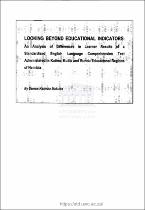| dc.description.abstract | This thesis attempts to develop an insight into why, contrary to expectation and predictions, learners in Rundu obtained better scores in a standardised English comprehension test than learners in Katima Mulilo, given that the conditions of teaching and learning were judged to be least favourable in Rundu. The main trends in literature indicate that in developed countries, the socio-economic status (SES) of learners has a greater influence on learner achievement compared to school factors, while the opposite is the case in many developing countries. However,
my research findings show that the use of SES measures that are more suitable to developing contexts confirms the prominence of SES, but of greater influence, are school factors such as the teacher's competence, commitment and motivation, as well as the leadership role of the school principal. Much of the literature assumes a causal relationship between ever-increasing numbers of more detailed indicators and learner achievement. The aim of my research was to examine why this assumed relationship led to unexpected results, and to identify indicators that are context sensitive to Namibia. The statistical analysis of the findings of the 1995 SACMEQ I project in Namibia, formed the basis of my research into the relationship between educational indicators and learner achievement. The analysis showed that SES measures such as parental education and wealth, as well as school factors such as teacher qualifications and regular homework showed a negative statistical relationship with learner achievement in Katima Mulilo. I argue that there is no automatic, causal and static relationship between pedagogical factors and learner achievement. ln response to the main research question, my fieldwork investigations showed that the poor performance in Katima Mulilo was influenced by school environmental factors such as teacher lack of knowledge, lack of enthusiasm and
inappropriate use of teaching methods. These factors interacted dynamically with community environmental factors such as tribal hostilities, political tensions and fear of witchcraft, with reciprocal influences to impact negatively on the operation of schools, teacher morale, and subsequently, learner achievement, whereas in Rundu, the internal micro dynamics in human interactions supported and incentivised teachers. Existing theories focus mainly on indicators of material inputs to schools as static separate variables that have a causal relationship with learner achievement. The contribution that my research findings make to academic debates about educational indicators and learner achievement is that in developing contexts such as Namibia, pertinent indicators relating to human behaviour, attitudes and the interaction between variables are in ever dynamic reciprocally influencing processes that have a greater influence on learning outcomes than the narrow notion of classical indicators. | en_US |

